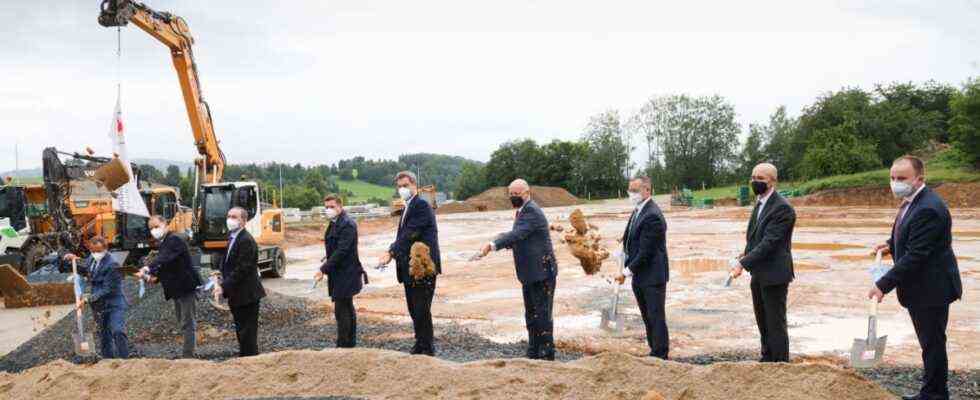The state government has high hopes for a factory that is now being built in Wunsiedel. But can hydrogen really contribute to a more climate-friendly future in practice?
Start of construction for a model project: construction work on one of the largest hydrogen factories in Germany has started in Wunsiedel. In simplified terms, the system is supposed to convert surplus energy from renewable sources into hydrogen by means of electrolysis. This should then flow back into the region for use. “Role model from Bavaria,” tweeted Prime Minister Markus Söder (CSU) on the occasion of the groundbreaking on Friday afternoon: “Green hydrogen for the future.”
In fact, the project in the Fichtelgebirge could become exemplary. Theoretically, hydrogen from renewable energies – so-called green hydrogen – can be used in a climate-friendly manner, in industry or in the transport sector. The Federal Government and the Free State are therefore pumping billions into the development of new applications. How great these hopes are can also be measured by the fact that, in addition to Söder, Economics Minister Hubert Aiwanger and Environment Minister Thorsten Glauber (both FW), i.e. three representatives of the state government, were announced for the groundbreaking ceremony.
How hydrogen can contribute to a more climate-friendly future in practice is still questioned. For example, it is unclear under what conditions its production on an industrial scale is successful. The new factory in Wunsiedel could provide information on this. Initially, production of 1350 tons of hydrogen is planned. Siemens, gas supplier Rießner Gase and Stadtwerke Wunsiedel are cooperating on the project. The latter developed the “Wunsiedler Weg”: a supply concept that relies on decentralization, electricity from renewable sources and cross-sectoral use of energy.
Wunsiedel is currently not the only hydrogen pilot project in Bavaria – which may also be due to the fact that the element with the abbreviation H₂ is Aiwanger’s favorite in the periodic table. Industry is also looking for ways to become greener. For example, Bosch in Bamberg wants to manufacture fuel cells on a large scale and MAN in Augsburg is working on a truck with a hydrogen drive. In spring, the state government also applied to the federal government for a hydrogen competence center in Pfeffenhausen near Landshut, and a decision is expected soon. And on Monday, Aiwanger wants to present Bavaria’s first trial run with a hydrogen train. The project is scheduled to start in 2024, and the train will also be a Siemens product.
To what extent hydrogen can even meet expectations is another question. Raimund Kamm, spokesman for the Bavarian State Representation of the Federal Association for Renewable Energy, sees the element’s benefits primarily as an energy supplier for industrial processes, for example in steelworks. In order to ensure the supply of green hydrogen in the long term, it is necessary to set up domestic production – and thus more investments in wind and solar energy. Both are “the workhorses of the energy transition”, but instead of “letting them gallop”, their expansion falls short of the goals. Kamm therefore sees “talking about hydrogen” as a distraction: the state government must first do its homework.

